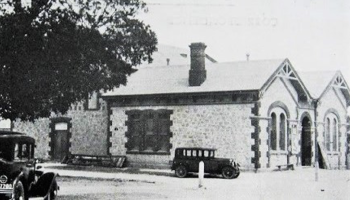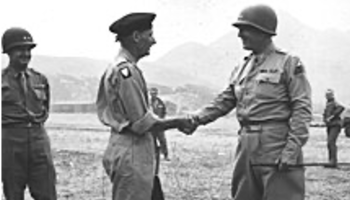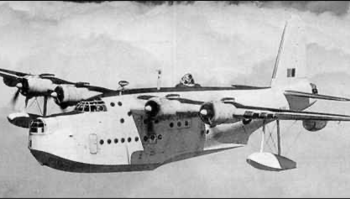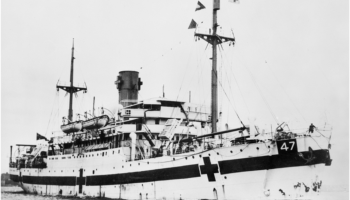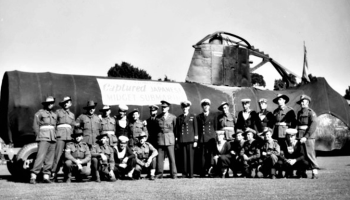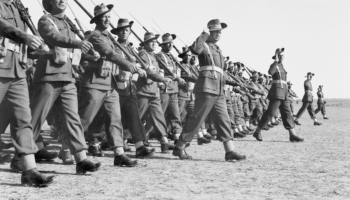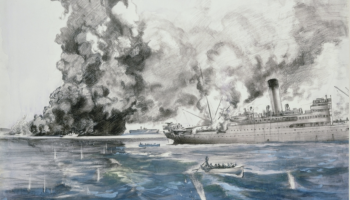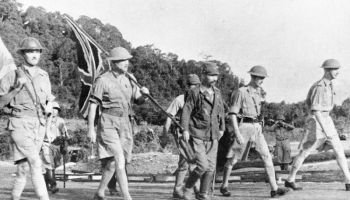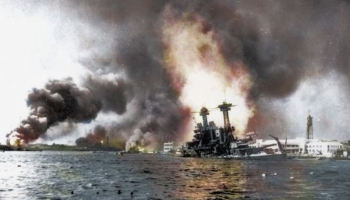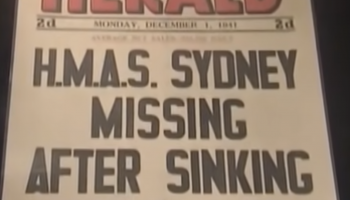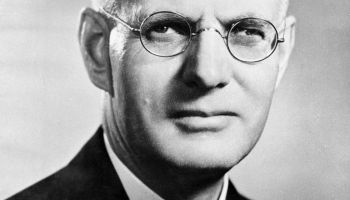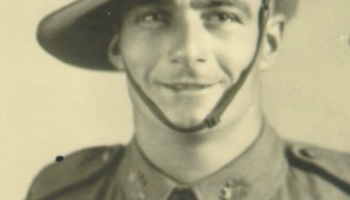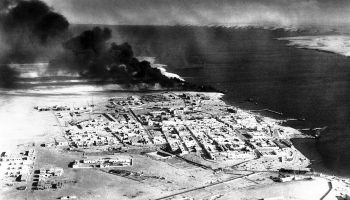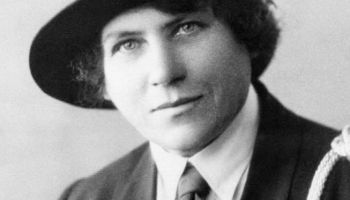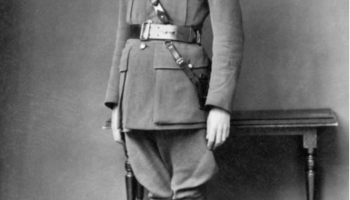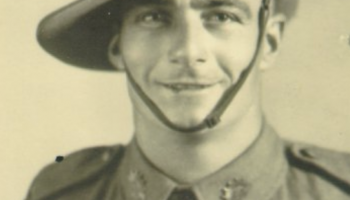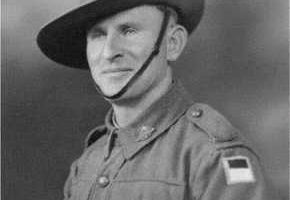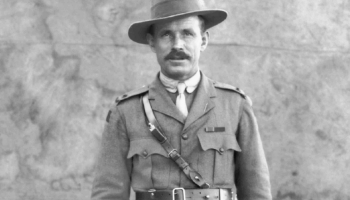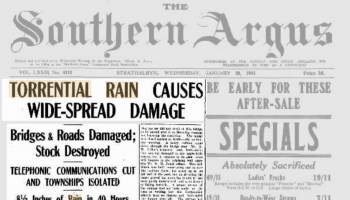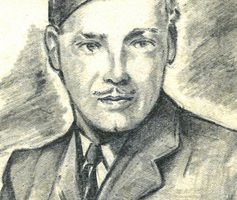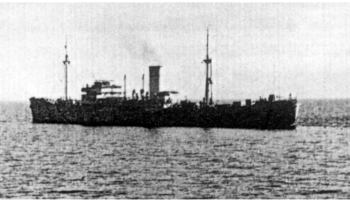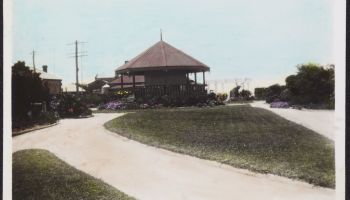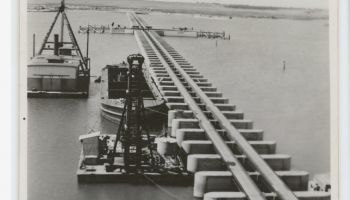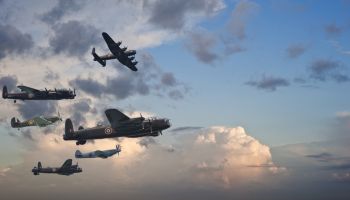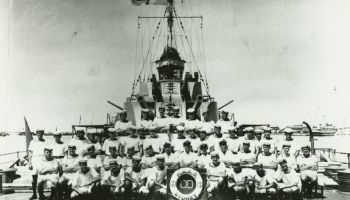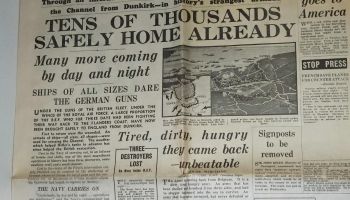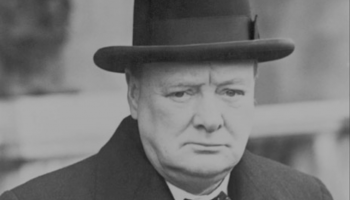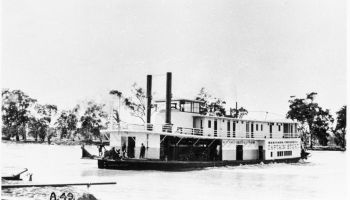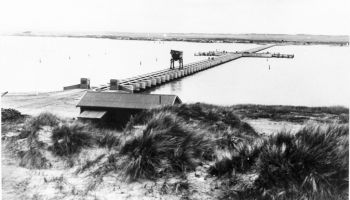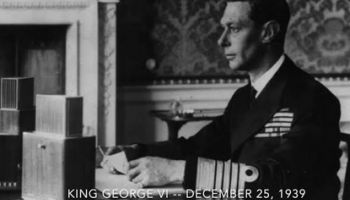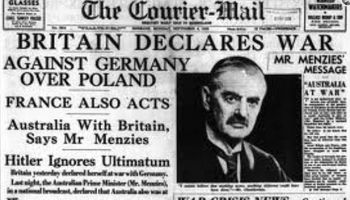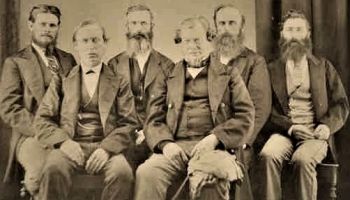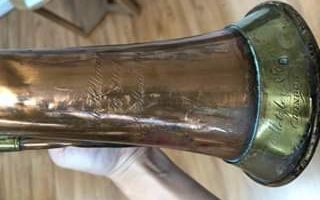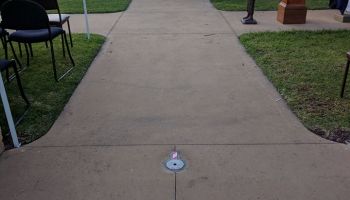Around the Town
Frank Tuckwell describes the war events in Papua New Guinea and in Northern Territory in August 1943. He also reports on the death of Frank Ayliffe and George Hall in Goolwa. Lopcal Red Cross events are also described.
The next monthly report by Frank Tuckwell covering the war fronts in Russia and Europe including the meeting between General Patton and General Montgomery, the Black Cat to Salamaua Track campaign in Papua New Guinea, Japanese raids over the Northern Territory, death of Trooper Dick Spencer from Goolwa and the town council building for the Goolwa Corporation.
Progressive reports on World War 2 from a Goolwa perspective as reported by Frank Tuckwell. Topics included more jungle training for service in Papua New Guinea, the journey to England by Percy and Marion Wells' daughter Marjorie, air raid in the Northern Territory, Goolwa enlistments, boat building and butter rationing.
Frank Tuckwell continues his reports associated with World War 2 and its effects on the community of Goolwa. This includes the Trident Conference between Roosevelt and Churchill, continued toll of bombing of Darwin, sinking of the hospital ship Centaur, jungle training and activities of Goolwa men returning from service in Africa and Europe.
Frank Tuckwell reports on the fighting in Wau New Guinea, the touring of the remains of a Japanese midget submarine from the attack on Sydney Harbour and the changes as local Goolwa men take on VDC home defence responsibilities.
Reports prepared by Frank Tuckwell covering the bombing of Darwin 1943, Battle of the Bismarck Sea, 9th Division AIF in Adelaide, service personnel returning on leave to Goolwa, death of LAC Glen Thompson, RAAF, and military service enlistments from Goolwa, especially women.
Darwin bears the brunt of the first Japanese bombs to fall on Australian soil. Frank Tuckwell reports on the devastating attacks during February 1942. Prime Minister Curtin stands up to Churchill. The Goolwa Home Guard makes its preparations for possible invasion on Goolwa Beach and the residents prepare their homes for blackout. The children also begin their training.
With the unexpected fall of Singapore to the Japanese, things become a lot more serious in Australia. Frank Tuckwell outlines the stories associated with the war itself as well as actions taken by the community of Goolwa during January 1942. Despite the ravages of war, the force on nature takes its toll in Goolwa.
With the bombing of Pearl Harbour, the war enters a new dimension. Historian Frank Tuckwell outlines the developments across the world as well as what was happening in Goolwa in December 1941.
Against the background of battles in Europe and other parts of the world, life continues in Goolwa during November 1941. The mysterious and devastating loss of the HMAS Sydney shocked the Australian nation. Frank Tuckwell describes what was happening in Goolwa during this time.
After Menzies and Fadden, the Governor General invites John Curtin to form government. Goolwa historian Frank Tuckwell outlines these momentous moves during wartime. This includes the formation of the Australian Women's Army Service (AWAS). He also keeps an eye on what was happening in Goolwa during October 1941.
Historian Frank Tuckwell describes the return to Goolwa by Sid Amey following his inuries during the Seige of Tobruk in Libya. He also provides information about fund-raising for Red Cross in the area during September 1941.
Further reports summarised by Frank Tuckwell, reflecting what was happening in Goolwa and the wider world during August 1941.
A report by Frank Tuckwell summarises what was happening during the war overseas and in Goolwa in July 1941.
The events of World War 2 overseas hits home to Goolwa families whose men were serving overseas. Historian Frank Tuckwell continues his reports.
Historian Frank Tuckwell reports on activities in Goolwa in April 1941. He also summarises the events associated with World War 2 in April 1941.
Frank Tuckwell reports on the war effort during March 1941 as well as the creation of the Fishermen's Association.
Historian Frank Tuckwell reports on the effects of torrential rain in South Australia, especially Goolwa, in February 1941. He also gives information on World War 2.
Historian Frank Tuckwell records activities in and around Goolwa in January 1941 as well as world events, some involving Goolwa people.
Frank Tuckwell's article covers activities in Europe as well as around Goolwa in November 1940.
Next episode of Frank Tuckwell's historical reports covering the World War 2 period. - Topics include the Goolwa and Coorong fishermen have too many fish and low prices, more local lads sign up to fight while the older men have to take up the slack to look after the RSL responsibilities, more power for street lights in Goolwa, Hitler meets Franco, Liverpool suffer blitz, and German ships operate off the Australian coast.
Historical report prepared by Frank Tuckwell OAM. Information covers the start of the Blitz in Britain, the arrival of the German cruiser Pinguin in Australian waters, the Goolwa Barrages, electricity supply to Goolwa.
Another episode of Frank Tuckwell's monthly history of what was happening in the world in August 1940 and how it was affecting the town of Goolwa and its residents. Includes Battle of Britain, Crash in Canberra killing 10 including politicians, Goolwa RSL, Goolwa enlistments, Flying Boat in Goolwa.
Frank Tuckwell continues his reports about what was happening around the town of Goolwa over the period of World War 2 - the war in Europe, changes to the nation's military forces legislation, Goolwa Red Cross Circle, Goolwa's electricity supply, SA Railways Pulman sleeper coach
If you were living in Goolwa in June 1940, what was happening? Read about Dunkirk and the associated events of World War 2 as well as what was happening to members of the Goolwa community.
Frank Tuckwell's May 1940 report of World War 2 and its effects on Goolwa as well as the follow up to the completion of the Goolwa Barrages.
What was happening in April 1940 in Goolwa? Preparing young men for war. Developments at the Goolwa Primary School. Selling off items after finishing the building of the Barrages. First ANZAC Day after the declaration of World War 2. Information about the Paddlesteamer Captain Sturt and its sale.
Photo of Goolwa barrages completed with view to opposite shore [PRG 1258/2/558] from State Library of South Australia
Recollections of life in Goolwa at the start of World War 2.
The first in a series of reports by Frank Tuckwell about the effects of World War 2 on Goolwa. This includes the completion of the Barrages at the mouth of the River Murray. There is a report about the Goolwa Sailing Cub.
Report from Alexandrina Council September 2019 meeting plus a final report on the history of the District Council Port Elliot and Goolwa and the Alexandrina Council.
This issue covers: * Region 6 meeting of the Murray Darling Association * Part 7 of the short history of our local Council 1853-1997 * Declaration of War in 1939
Frank Tuckwell's next part on the history of the precursor to the Alexandrina Council, the Corporation of Goolwa and some of the people who were part of Goolwa's amazing history stories.
The end of the riverboat trade at the 'turn of the century' in Goolwa and Australia's Federation, saw some interesting developments in local and state Government. This report also comments on Goolwa's contribution to World War 1 and ends with information about a 'Back to Goolwa' celebration in 1929.
Story of Federation of Australia as associated with Goolwa. Part played by Archie Dowland and Thomas Dowland is outlined. Also information about Middleton residents' response to road issues associated with b-double trucks.
Historic bugle stolen from Goolwa Museum recovered. A short history of the Goolwa Local Government 1853-1997 (Part 3)
AROUND THE TOWN - March’19 - by Frank Tuckwell
This month, historian Frank Tuckwell provides some insight into parts of the history of the Alexandrina Council and its early formation as the District Council of Port Elliot and Goolwa. This report also includes information about Ngarrindjeri Elder Darrell Sumner, Alexandrina Council and the final session of the Australian Federal Court and its determination of the Native Title case handed down in the Sturt Reserve, Murray Bridge in December 2017.
As the town of Goolwa passed through the many days of joyous celebrations and thanksgiving for peace and the end of the greatest war the world had ever known, they did so to let go to four years of tension and fears for safety of those engaged in the conflict.
